- Home
- Lisa Wingate
Dandelion Summer Page 9
Dandelion Summer Read online
Page 9
“Those stairs are none of your business.” He tried to get a handhold to turn himself around, but he couldn’t do it. His arm quivered and caved in, and he slid on the magazines again, then just stayed there, breathing hard. I felt sorry for him, until he opened his mouth again. “They’re my stairs. I can climb them if I wish.”
He brought out the Epie in me, and she brought the attitude. “Well, that ain’t what your daughter says.”
“I’ll thank you not to use such grammar in my house. Poor grammar is a hallmark of poor education. I suspect you’re a more intelligent girl than you portray. I’ve seen you doing your homework.”
I wasn’t sure whether I should get insulted or feel like he’d paid me a compliment.
“Well, listen at you, Mr. High and Mighty,” I said. “I’m not the one on the floor, now, am I?”
He snorted, grabbing his own leg and trying to pull it around. “As you’ve already invaded my privacy here, you could help me to my feet.”
“I don’t know if I want to.” Shoot, it might be good for him to stay there on the floor awhile. “I help you up, you’ll go climb the stairs again. Maybe I ought to just go ahead and call your daughter. She can figure out how to keep you off the stairs.” I looked the mess over, and I could pretty much figure out what’d happened. “Were you trying to move that big old trunk down here?”
“It slipped,” he said, like it was an excuse. “Otherwise, I was getting along just fine.”
“Yup. You look fine.” I cleared out some papers and stuff so I could get in behind him and hook my elbows under his armpits, the way I’d learned to do with Mrs. Lora after she got so sick. The worst part about helping somebody out of a spot like that wasn’t the lifting; it was that it was embarrassing. While I was dragging J. Norm off the stairs, I thought the same thing I used to when I helped Mrs. Lora off the bathroom floor: Man, if I ever get like this, I’m gonna find a gun and shoot myself. I wondered sometimes if God would hold it against a person if they got in such bad shape that they couldn’t take it anymore, and so they did something. I knew the answer, of course. One thing me and Mrs. Lora did together was go to church. Every time the doors were open. Mrs. Lora was a Southern Baptist, and so the doors were open a lot. Even after she got weak and wobbly, and her skin turned yellow and thin, I’d help her to the car on church nights, and we’d putter the six blocks across town. I drove, even though I barely had my learner’s permit. It wasn’t far, and we never went over thirty.
I dragged J. Norm off the last couple steps. He groaned, because I was yanking his arms off, but I didn’t have any choice. By the time we got out of the opening, both of us were huffing and puffing. J. Norm rolled over and sat up against the wall with his legs folded to one side and his head leaned back, and I slid down against the doorway.
“You all right?” If we had to call an ambulance, we’d be in so much trouble. What would I do tomorrow if I didn’t come here? If I got caught anyplace but at school, Mama’s house, or work, I could kiss my happy home good-bye. At least being here was better than being at home.
“You think I better call the doctor?” I asked.
“Most certainly . . . not.” J. Norm cracked one eye open—just a little slice of blue with bloodred around it, but it looked like he meant business.
“You at least gonna take the pills your daughter said you should eat if you got a heart spell?” His shirt pocket was hanging open a little, something round inside. I figured it was the pill bottle. He patted a hand over it, like he was making sure.
“Just need to . . . catch my breath.” He wheezed and coughed, the sound weak, thin, and hacky.
I didn’t know if I should believe him or not. A couple times, Mama’d laughed and called this job the suicide watch. She figured someone as nasty as J. Norman Alvord didn’t deserve all the fuss. “But you’ll take the medicine if you need it, right?”
His eye closed, and he pulled his lips together over his teeth, then swallowed hard, his chin jerking up and down like it hurt to do. “I . . . believe so.”
“You promise?”
The one eye opened again. “Beware. You . . . could be mistaken . . . for someone . . . who actually cares.” He spit the words out in little breaths.
Heat went into my cheeks and drained down to my shoulders. Was he teasing with me? Maybe his plan was to keep me talking until it was too late for me to force a couple of the pills into his mouth. Maybe that’s why his teeth were clamped so tight. “I just don’t want you to go and have a big, stupid heart attack while I’m here, all right? At least not till after I get paid for this week. I got plans for that money.” Every week, my money was in an envelope on the counter with Deborah’s supper note. Cash, the cold, hard kind. I’d been socking it away, not giving it to the church to pay for damages like Mama thought. DeRon had told me that some anonymous athletic booster was gonna pay off all the broken stuff, so the basketball boys wouldn’t end up in trouble. If Mama knew that, my money would be gone to pay the light bill, or buy beer, but she didn’t know, so it was all good.
J. Norm kind of laughed, or maybe he was just coughing. Finally, he settled down again and some color came back into his skin. “I’ll endeavor . . . not to expire . . . before next payday.” He opened both eyes and watched me like he was trying to figure me out. It made me feel weird. Mostly, people don’t look at you real close when you’re sixteen. They don’t try to see inside. They just take a pass at what clothes you’ve got on and your makeup and whatever, and put you in some box or other. Good kid, bad kid, sexy kid, regular kid, poor kid, rich kid, got potential, got none. That’s okay, sorta. It keeps you from having to work too hard to show them anything.
“Well, because where else am I gonna get me a job around here?” I pointed out.
“Get myself a job.”
“Yeah, exactly.”
He smiled a little. It looked like his pasty old face might crack, but he did it. “I suspect that you could do anything you set your mind to.”
I stared at him for a sec, trying to figure out what he meant by that, because at first it sounded like J. Norm had actually said something nice. “You sure you’re all right? I’m not gonna need to, like, do CPR on you or anything, am I? They taught us that in health class at my old school.”
“A frightening thought. Health class . . . CPR.” J. Norm closed his eyes and shook his head, static fuzzing his little hairs against the paneling. “I don’t think any lifesaving measures . . . will be necessary.” He sat there a minute longer, then turned toward the wall and started to fold his feet under him, his hands pushing for support.
I got up and stood behind him with my arms out like I might catch him. I guessed I would’ve if he’d needed it, but he didn’t. He wobbled a little on his feet, looking at the mess that’d come out of the trunk. “Magazines,” he grumbled. “Life magazines.”
“These are seriously old-school.” I leaned down and grabbed one. It had a sailor kissing a girl on the front. “Where’d you get all these?”
Taking a hankie out of his pocket, J. Norm wiped his forehead. “They were my mother’s, I’m sure. She was a woman given to reading and to saving things.”
“Looks like it.”
He reached for one of the magazines, but stumbled instead.
I caught his arm. “Tell you what, J. Norm. How about you go sit down in that room you lock yourself in all the time, and I’ll pick up the stuff here? You want me to take it back up the steps, or what?” I looked at the stairs, trying to figure if I could get the box up there or not. But if we left it like this, Deborah would see it when she came, and there’d be trouble. One way or another, I had to get J. Norm’s mess cleaned up.
He shook his head, looking at the trunk. “Nothing but magazines. Trash.”
The magazines were cool, actually. I picked up a couple more. “What was supposed to be in there?”
He sighed, his shoulders sinking. “A dream,” he whispered as he walked away. “A midsummer night’s dream.”
&nb
sp; I cleaned up the mess and hauled it all back upstairs. The attic was, like, three times the size of our house. From the center part around the stairway, the peaks of the roof ran out in four long tunnels, each one with a window, so there was plenty of light. The place was dusty and smelled old, and cobwebs hung in the eaves like Halloween decorations, but it was quiet and kind of interesting up there. When I finished putting everything back, I stood on the top stair a minute, looking at old doll furniture and a three-story dollhouse I would’ve killed for when I was little. There were boxes of toys that’d never been opened—rockets you could put together and shoot off, and model cars, and a coffee can filled with brushes and paints that were all dried up. The space near the stairway was like a toy store, frozen in time. It was hard to imagine having all that stuff—so much you crammed it in the attic and left it there.
I picked out a few of the magazines to ask J. Norm if I could keep them and look at them. We had a paper to do in my stupid English class, for one thing. Maybe I could get stuff out of the articles. If Mrs. Brown didn’t like stuff about weeds, maybe she’d like stuff about the John F. Kennedy assassination.
Finally, I went back and found J. Norm in his office at the top of the stairs. He was sitting in the chair with his elbow braced on the desk and his head resting on his hand, his face turned the other way.
“I cleaned everything up,” I said, standing in the doorway. “Can I borrow a couple of these to read? I like history all right.”
“Take any you like. Keep them. I don’t want them.”
“The trunk and the magazines and all. It’s back up in the attic.”
“You should have called me to help.” He turned slowly toward me. “That trunk is too heavy for you.” But he didn’t look ready to get out of that chair. He looked worn-out.
“Oh, no,” I told him. “First of all, no way you’re falling down the stairs again. If you want something from up there, you’ve gotta tell me, okay? I’ll go up and get it. And second of all, I hauled the trunk up and then put the magazines in it. I’m not stupid.”
“No, you’re not.” It was weird having J. Norm actually be nice to me. It worried me a little. Sitting there at the desk, he looked shrunk up and sad, just staring at the wall again.
“What were you really looking for in that trunk?” I took a step into the room, then another. The wall in front of his desk was crowded with certificates in frames, pictures, and plaques with his name on them. J. Norm went to school at Clemson University once upon a time. His folks must’ve had money, just like he did. The only place I’d ever seen that much official stuff was in the doctor’s office.
“Clues.” The word came out in a long, slow sigh.
“What kind of clues?” I held the little stack of magazines against my chest and moved a little farther in. Beside the college degrees, there was a black-and-white picture of a young guy in a graduation robe standing with his mama and daddy. The face looked a little like J. Norm’s, but sometimes it’s hard to see who somebody was in who they are now. “This you and your folks?”
“Yes.” The word was flat, like he wasn’t really interested in talking about it. “Graduation from Clemson. I went for a master’s degree after that.”
“Man.” There was a big brick building in the back of the picture, an important-looking place like a queen would live in. “You must’ve been some kind of smart.”
“Failure wasn’t an option in my family. Success was expected.”
“You still had to be smart, though.” Next to the diplomas there was a picture of J. Norm and some other guys in front of a rocket like they used to shoot off to the moon. They all had on white shirts and thin neckties and dark pants, and a whole chain of name badges hanging off their shirts.
“I worked hard.” His voice perked up a little. “It was an exciting time. An important time.”
I looked into the eyes of those young guys in the picture and wondered what they were thinking, standing there by that giant rocket. Maybe they wanted to hop in and ride it to Mars. “You shoot rockets into outer space, or is that, like, a missile or something?” Maybe J. Norm invented the A-bomb or the computer. He was probably old enough.
In the corner of my eye, I saw him lean around to see what picture I was looking at. “That’s an Atlas/Centaur rocket.”
“You bomb somebody with it?”
“Just launchpad thirty-six-A. That particular rocket caused the worst explosion in the history of Cape Canaveral.” He rolled the chair up closer, so that he was just behind me and off to one side.
“Whoa, really?”
He rocked back in his chair, and when I glanced over at him, his eyes seemed far away. Lacing fingertips together, he cupped them behind his head. “A tiny, ten-dollar part failed. It’s a bit of a long story.” His hands turned loose, then went down to his lap and hung there.
“You got someplace important to be?” I leaned up against the wall to listen. One of the plaques tipped off square a little, and he watched it like he was afraid it was gonna fall. “’Cause I don’t. I’m here till six.” I caught the plaque with two fingers and pushed it back onto the nail, reading the words underneath the picture:Let it be recorded that:
When future generations look back on man’s conquest of space, the soft landing of an instrumented spacecraft on the lunar surface will mark a most significant milestone . . . advancing man’s technological capabilities and providing the world its first close-up look at a celestial body, and that
J. Norman Alvord
as a member of the Surveyor team shared in this exciting venture and contributed to the successful achievement of the program goals . . . paving the way for man’s journey to the planets.
“Whoa,” I said. “That’s you.” But J. Norm didn’t answer. When I turned around, he had his grouchy look back.
“We’d better go downstairs now. Deborah may come by,” he said, and scooted to the edge of the chair, pushing himself to his feet, his arms wobbling like licorice ropes. “Straighten that frame properly, will you?”
I fixed the plaque and checked my watch. I didn’t really want to go downstairs. It was more interesting up here. I hadn’t looked over this territory yet. “She’s not usually here till it’s time for me to go.” Lots of nights she didn’t stop by at all when I was there. For a sec, I thought about asking what in the world was the problem with him and his daughter. It seemed like if you lived in a house like this and had all the stuff they had, you could get along. Mostly, Mama and me fought because I cost her money.
I walked out of the office with J. Norm, then followed him to the stairs, carrying my magazines. He caught a toe and stumbled a little, so I slipped around and got in front. “Here, hold on to my shoulder. You already did the backstroke down the stairs once today, remember?”
He put a hand on my shirt and leaned harder than I thought he would, and we moved on. “More of a swan dive, actually,” he said.
I laughed a little. “Well, Mr. J. Norm, I think you just made a joke.” Who would’ve thought it, but J. Norm had a sense of humor—kind of like an appendix, I guess, since he didn’t use it for much. “That was pretty good.”
We got to the halfway point where the stairs turned, and he stopped to rub his leg. “I won’t make a habit of it.”
“I didn’t figure you would.” After that, there didn’t seem to be much to say. I took him to the room off the kitchen, where he could watch TV. He held the chair arms and lowered himself in like a crippled man.
“I could bring your dinner in here if you want,” I said, feeling sorry for him.
He shook his head and grabbed the TV remote. “I’ll get to it later. I do know how to use the microwave.” He slumped back in his chair, like he didn’t want to talk to me, and he turned on a show, then picked up one of those big, thick newspapers he kept piled by his chair. The New York Times.
“Whatever.” I knew I’d better go in another room before things got ugly, but for some reason, I stopped halfway to the kitchen door. “Did you r
eally do all the things on the wall up there? Shoot off rockets and stuff?”
He opened the newspaper and disappeared behind it, trying to get rid of me, probably. “Yes.”
“So did you ever, like, bomb anybody?”
Lowering the paper, he frowned like he was really into the New York Times and I was bothering him. “It was a different sort of battle. A battle to see who could get there first. To the moon. The fate of the free world depended on it—at least, that was how we felt about it at the time.”
“No joke?” I wondered if he was pulling my leg.
He pointed at my magazines. I’d forgotten I was still carrying them. “There might be a bit about it in some of those. I don’t know if those were my mother’s or Annalee’s. My wife saved everything, too. ‘It’s our history, Norman,’ she always said.”
I looked down at the magazines and thought maybe I shouldn’t take them, after all. Then I guessed it didn’t matter. If he wanted that stuff, it wouldn’t be packed away in the attic. I wondered how long his wife had been dead, but I knew better than to ask. People didn’t like to talk about that kind of thing, and talking with J. Norm felt like walking on ice over a pond. The ice could break any minute, and you’d be up to your nose in cold water. “That why there’s so much junk up there?”
“You collect things over the years.”
“Guess so.” I thought about our little house. There wasn’t anyplace to collect stuff. Everything my mama’d kept—our history—was in a couple boxes stuffed in the corner of a closet. There wasn’t much worth saving, I guessed.
I still wanted to know why J. Norm was up in that attic. “So tomorrow I can help you look in the attic some more.” Maybe it was because I’d been digging in my own family secrets, or maybe it was because J. Norm had some cool stuff up there, but I didn’t want him to find things without me.

 Before We Were Yours
Before We Were Yours A Sandy’s Seashell Shop Christmas
A Sandy’s Seashell Shop Christmas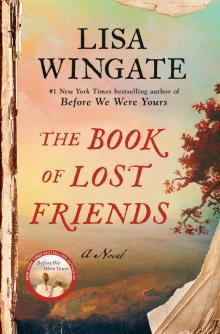 The Book of Lost Friends
The Book of Lost Friends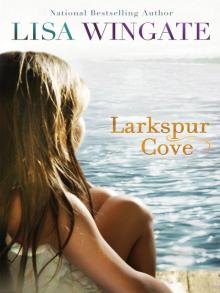 Larkspur Cove
Larkspur Cove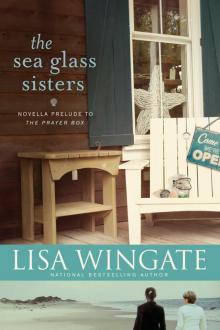 The Sea Glass Sisters
The Sea Glass Sisters The Language of Sycamores
The Language of Sycamores Dandelion Summer
Dandelion Summer Word Gets Around
Word Gets Around Beyond Summer
Beyond Summer Firefly Island
Firefly Island The Tidewater Sisters: Postlude to The Prayer Box
The Tidewater Sisters: Postlude to The Prayer Box Talk of the Town
Talk of the Town![Blue Sky Hill [01] A Month of Summer Read online](http://i1.bookreadfree.com/i1/03/29/blue_sky_hill_01_a_month_of_summer_preview.jpg) Blue Sky Hill [01] A Month of Summer
Blue Sky Hill [01] A Month of Summer A Thousand Voices
A Thousand Voices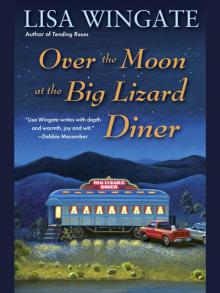 Over the Moon at the Big Lizard Diner
Over the Moon at the Big Lizard Diner Never Say Never
Never Say Never Good Hope Road
Good Hope Road The Summer Kitchen
The Summer Kitchen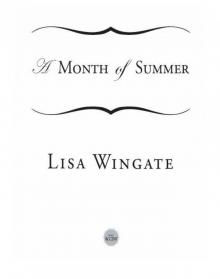 A Month of Summer
A Month of Summer Blue Moon Bay
Blue Moon Bay Drenched in Light
Drenched in Light The Sea Keeper's Daughters
The Sea Keeper's Daughters